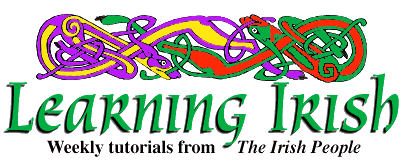
Irish Lesson 49
Pronunciation The letter group "igh" at a word end usually gets the sound (ee), sometimes shortened and sometimes nearly the full length that an "í" would have. In some parts of Ireland, the sound retains a faint (g) at the end, so that "suigh" would be (sig). Some examples: suigh (si), luigh (li), ceannaigh (KAN-ee), imigh (IM-ee), bailigh (BAHL-ee). The síneadh fada is generally not found on the "i" of final "igh," but a few words have it to prevent doubt: cloígh (klee), defeat.
Pronunciation Exercise Read this passage slowly without looking at the key below it. Then read it a second time, making use of the key if you are unsure. Do not try to make sense of the words; concentrate on the pronunciation and on grouping the words into phrases:
Le tamall anuas, léitear cead cainte ar mhodh an aistriúcháin. Bhí fleá le bheith faoin phíce atá ina láimh, agus saothar liteartha a bhfuil ráite cheana féin. Idir fhorbairt agus uile i gCois Fharraige le pinsin mhaithe acu do na glúnta atá ag teacht taobh istigh go raibh seilbh acu trí chéim san obair, le foilsitheoireacht oideachais.
le TAH-muhl uh-NOO-uhs, LAY*-tyuhr kad KEYENT-e er vwoh un ASH-troo-k*aw*in. vee flaw* le ve fween FEEK-e taw* IN-uh LAW*-iv, AH-guhs SAY*-uhr LI-ter-huh uh vwil RAW*-tye HAN-uh fay*n. ID-ir OHR-birt AH-guhs IL-e i gish AH-rig-e le PIN-shin VWAH-e ah-KUH duh nuh GLOON-tuh taw* uh TYAHK*T tay*v ish-TEE goh rev SHEL-iv ah-KUH tree hyay*m suhn OH-bir, le fwil-shi-HOH-i-rahk*t i-DAHK*-hish.
Grammar We now begin the future tense. The first forms will be for the verb "tá." To say "I shall be" or "I will be," the form is "beidh mé" (be may*). In some parts of Ireland, this is pronounced (beg may*). The rest of the future is: beidh tú (be too), you will be beidh sé (be shay), he will be beidh sí (be shee), she will be beimid (BE-mid), we shall be beidh sibh (be shiv), you will be beidh siad (be SHEE-uhd), they will be These forms can be combined with the verbal noun in the same way that you form "Tá sé ag teacht" to say "He is coming." "Beidh sé ag teacht" means "He will be coming." The negative of "beidh" is: Ní bheidh mé (nee ve may*), I shan't be Ní bheidh tú (nee ve too), you won't be; etc. Examples of the negative's use: Ní bheidh Seán ag an siopa; John won't be at the store. Ní bheidh airgead agam; I won't have money.
To ask a question, the forms are: An mbeidh mé? (un me may*), will I be? An mbeidh tú? (un me too), will you be? Etc. The negative questions are: Nach mbeidh mé? (nahk* me may*), won't I be? Etc.
Vocabulary amárach (uh-MAW*-rahk*), tomorrow go deo (guh DYOH), forever (in the future) an bhliain seo chugainn (un VLEE-in shuh HOO-in), next year (literally "the year coming toward us") go luath (guh LOO-uh), soon an tseachtain seo chugainn (un TYAHK*T-in shuh HOO-in), next week (literally "the week coming toward us") feasta (FAS-tuh), henceforth, in the future
Drill Go through a progressive drill with "beidh." Start with: An mbeidh mé ar an mbus amárach? Ní bheidh mé ar an mbus amárach. Beidh tú ar an mbus amárach. An mbeidh tú ar an mbus amárach? Etc. The last sentence will be: Beidh mé ar an mbus amárach.
Reading Exercise Tháinig an bus faoi dheireadh, agus chuaigh na paisinéirí go léir air. "Tá súil agam go mbeidh suíochán compordach agam," dúirt Brian leis féin. Bhí cúpla suíochán thiar i gcúl an bhus, agus shúil Brian siar fan phasáiste. Leathuair ina dhiaidh sin, bhí an bus sa chathair, agus tharraing Brian an corda chun comhartha a thabhairt don tiománaí. Stad an bus ag an gcúinne, agus thuirling Brian.
Key: HAW*-nig un bus fwee YER-uh, AH-guhs HOO-ig nuh pahsh-i-NAY*R-ee goh lay*r er. "taw* SOO-il uh-GUHM guh me see-K*AW*N kuhm-POHR-dahk* uh-GUHM," DOO-irt BREE-uhn lesh fay*n. vee KOOP-luh see-K*AW*N heer i gool un vus, AH-guhs HYOO-il BREE-uhn SHEE-uhr fuhn fuh-SAW*-shte. la-OO-ir nuh YEE-uh shin, vee un bus suh K*AH-hir, AH-guhs HAHR-ing BREE-uhn un KOHR-duh hun KOH-uhr-huh uh HOO-irt duhn ti-MAW*N-ee. stahd un bus eg un GOON-ye, AH-guhs HIR-ling BREE-uhn.
Translation: The bus came at last, and the passengers all went on. "I hope that I will have a comfortable seat," said Brian to himself. There were a couple of seats back in the bus, and Brian walked back along the aisle. Half an hour later, the bus was in the city, and Brian pulled the cord to signal the driver. The bus stopped at the corner, and Brian got off.
Notes: "Back" in the sense of distant is "thiar." When you walk or move back, you go "siar." This is similar to "thuas," meaning "above," and "suas," meaning motion upwards. Irish often uses a verb and noun where English would use only a verb. We say, "chun comhartha a thabhairt," to give a signal, instead of "to signal." You will see more of this as we go on.
(c) 1998 The Irish People. May be reprinted with credit. |